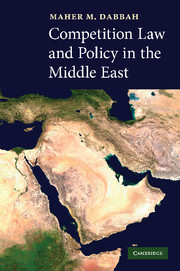Book contents
- Frontmatter
- Contents
- Preface
- List of abbreviations
- 1 Introduction
- 2 The relationship between Islam and competition law and policy
- 3 Israel: the region's oldest competition law
- 4 Turkey: a European dream from the other side of the border
- 5 The Arab Maghreb countries
- 6 Jordan's 2004 Competition Law
- 7 The Gulf States: a possible model for regional cooperation
- 8 The Arab Republic of Egypt: the chase after globalisation
- 9 Lebanon and Syria: a tale of two states
- 10 Conclusions
- Index
10 - Conclusions
Published online by Cambridge University Press: 20 July 2009
- Frontmatter
- Contents
- Preface
- List of abbreviations
- 1 Introduction
- 2 The relationship between Islam and competition law and policy
- 3 Israel: the region's oldest competition law
- 4 Turkey: a European dream from the other side of the border
- 5 The Arab Maghreb countries
- 6 Jordan's 2004 Competition Law
- 7 The Gulf States: a possible model for regional cooperation
- 8 The Arab Republic of Egypt: the chase after globalisation
- 9 Lebanon and Syria: a tale of two states
- 10 Conclusions
- Index
Summary
The Middle East is a region with unlimited economic opportunities. Regrettably, however, these opportunities have always been overshadowed by serious challenges facing almost all MECs and their citizens posed by poverty, illiteracy and conflict, to name but a few. There is perhaps no other ‘man-’ or ‘government-made’ reality more bitter and frustrating than the one prevailing in the Middle East. In light of this, it is all the more important to appreciate the remarkable skills enjoyed by many citizens in the region to achieve economic prosperity and to seek innovative ways of promoting enterprise and improving the productivity of MECs and the Middle East as a whole. Equally important here is an appreciation of the considerable efforts made by MECs themselves to advance their economic causes and interests. For many years, Middle Eastern economies were largely underdeveloped, a situation that has come to change in recent times with the noticeable – albeit in the case of some MECs slow – economic transformation throughout the region. Serious attention has come to be given by almost all MECs to achieving highly important economic objectives such as: privatisation within different sectors of domestic economies; trade liberalisation; attracting foreign investment; and establishing technologically advanced and services-based economies. Engaging in these initiatives by different MECs has created fresh hopes for building a generally enabling, transparent and non-discriminatory environment – resting on the idea of having a process of competition – within which domestic and foreign investment can flourish.
- Type
- Chapter
- Information
- Competition Law and Policy in the Middle East , pp. 297 - 328Publisher: Cambridge University PressPrint publication year: 2007



